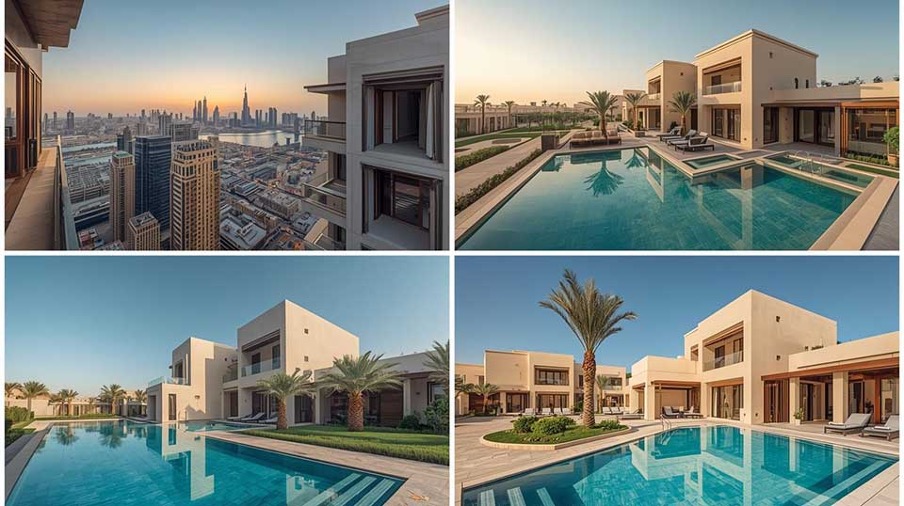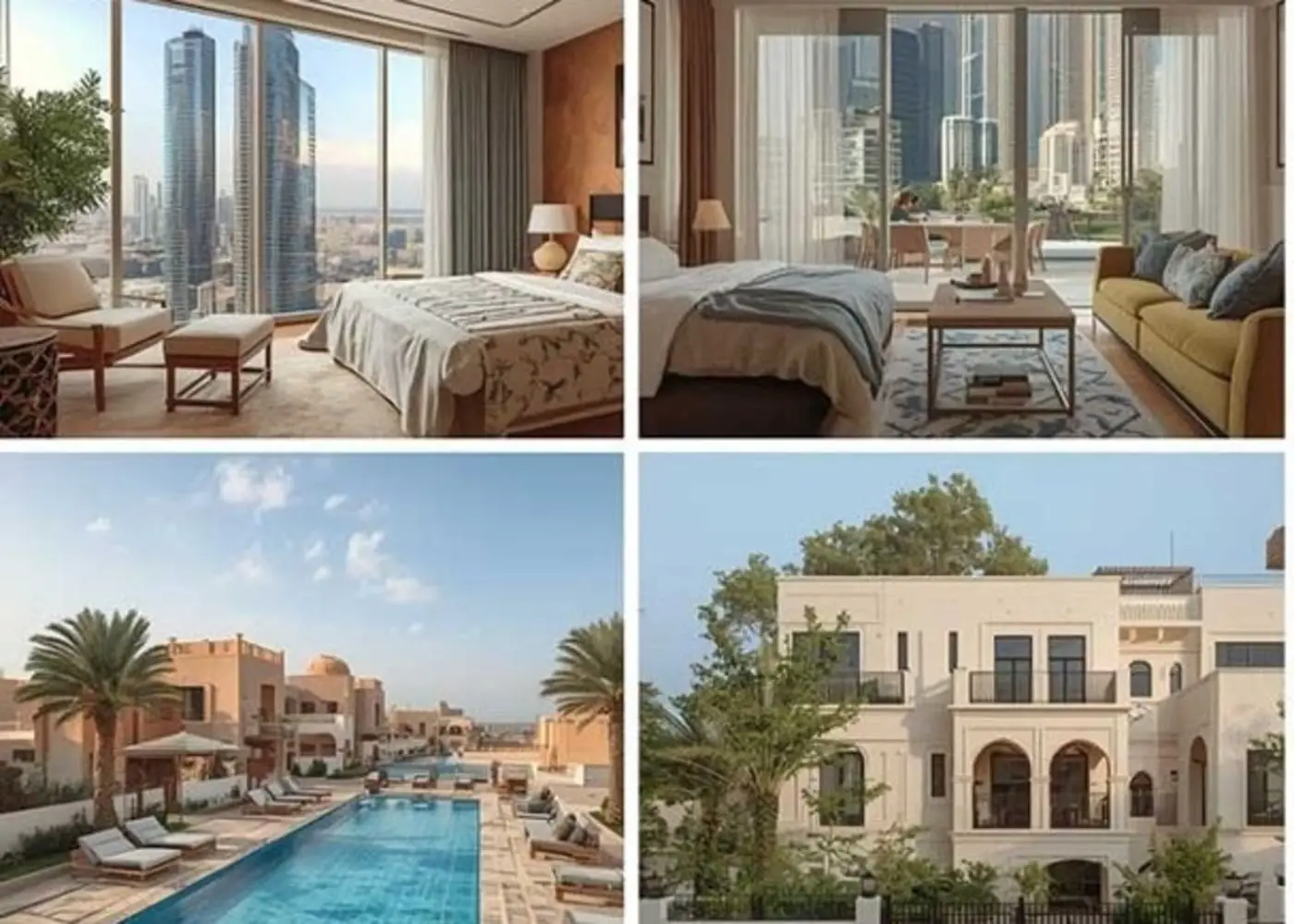On a Friday evening in Dubai, the metro is packed with workers heading home. Some will climb the stairs to shared apartments where six people squeeze into one room. Others will step into sleek towers, swipe a card at the lobby, and ride up to a studio that’s theirs alone.
From bed spaces carved out of partitioned flats to self-contained studio apartments, the spectrum of choices reflects the city’s contrasts—and the challenge of finding a place that fits both lifestyle and budget.
Why Housing is a Key Challenge for Expats
Moving to Dubai often comes with a reality check:
1. Rents Are Racing Ahead — Salaries Aren’t
Every year, more people pour into Dubai. That means more competition for places to live—and rent prices keep climbing. In just one year, rents jumped around 16 %, yet salaries stayed flat, zero percent change. For anyone earning a middle-income wage, that gap is hard to bridge.
2. A Market Built for the Well-Off
Real estate developers have found their groove: luxury tower after luxurious tower, aimed at high-earners and investors. That focus pushes the affordable options out of reach for many.
3. Cramped Living Hidden in Plain Sight
For low-wage workers, partitioned flats and bunk setups in old buildings have been a way to scrape by. But after fires in some densely packed buildings, officials stepped in—and suddenly, these makeshift homes are off-limits. Some families now find themselves with nowhere safe or legal to go.
4. Heat, Bugs, Mold — Not What You Signed Up For
Dubai’s relentless heat comes with a dark side—think mold, pests, and A/Cs that go kaput. Many expats don’t notice until they arrive. The advice? Have a proper walk around before you put any money down.
Look carefully at the ceilings and corners for any signs of damp or water damage. Don’t be shy about asking who will handle repairs if something goes wrong. It’s easy to get carried away by reassurances, but having clear answers up front saves you headaches later.
5. Paperwork and Trust Issues
Not knowing your rights—or missing paperwork—can land you in trouble. Dubai’s Ejari system (an official registry) exists to protect both tenant and landlord—but not all leases get registered.
If you don’t have proof, it’s your word against theirs. Keep every conversation and transaction in writing—that way, you won’t be left stranded if something changes.
Finding a place to live in Dubai isn’t simple.
Rents climb fast, good homes are limited, and not every deal is as solid as it looks. In such situations, many immigrants decide to be realistic. This way, they manage problems by doing their homework and maintaining flexibility. Finding the right place may take time, but possible.

Bed Spaces: Entry-Level Living
Bed space in Dubai is the ultimate budget option: think bunk beds or shared rooms, usually rented by the bed, not the room. In neighborhoods like Deira, Al Karama, Al Qusais, or Al Nahda, you’ll find rates from roughly AED 450 to AED 1,200 a month.
Places listed on platforms often feature shared beds or partitions, with some options as low as AED 800 in Karama. These setups can save you a lot of money and are often the first step for newcomers building their life in Dubai.
While they are simple and shared, many expats appreciate the sense of community they bring. Choosing listings from trusted platforms such as Homebook helps ensure that the property meets safety and legal standards, giving peace of mind along with affordability.
If you're fresh on a tight budget and navigating Dubai's steep rents, these spaces serve their purpose. Just go in eyes open—and always check for safety and legality before signing anything.
Shared Rooms and Partitioned Flats
Some expats turn to shared room for rent in dubai or makeshift partitioned flats because traditional rentals in Dubai can feel out of reach. In shared flats, you get a private (or semi-private) room but still split the kitchen and utilities with others.
Rent is easier on the wallet, and it’s a built-in social circle—especially helpful when you’re new and alone. But partitioned flats—where landlords carve small cubicles out of one or two-bedroom units—are another story.
These options save a great deal on rent and work well for people who want a semi-private lifestyle without the higher cost of a full apartment. Shared rooms can be a good way to meet people and feel less isolated, which helps when you’re new in the city.
Partitioned flats, on the other hand, need more careful consideration before you decide. When partitioned flats are set up the right way and advertised through trusted platforms like Homebook, they can offer a mix of reasonable cost and comfort. Still, it’s worth checking that the place has good airflow and the necessary approvals, so your stay feels both safe and comfortable.
Studio Apartments: Independence and Privacy
Studio apartments give you your own space—no sharing walls with strangers, and every corner is yours to control. They’re just one room, but that simplicity makes them easy to clean, straightforward to rent, and perfect for people who value privacy and independence in a big city buzz.
Where to look—and what it costs:
In Jumeirah Village Circle (JVC) or Al Nahda, you can find studios for around AED 25,000 to AED 45,000 per year—one of the more budget-friendly options.
Move closer in towards Dubai Marina or Downtown, and rents jump to about AED 40,000–100,000 per year, depending on the building and perks like a gym or pool.
Practical tips to keep in mind:
Before you sign, test the air conditioning, turn on the taps, and check that safety basics are in place.
Many studios come furnished, which is handy if you’ve just arrived and want to settle in quickly.
Don’t forget to register your lease with Ejari. It’s not just paperwork—it’s what allows you to connect utilities, apply for a visa, and protect your rights as a tenant.

All Comment 2
Login to post a comment
No comments yet
Be the first to drop a comment